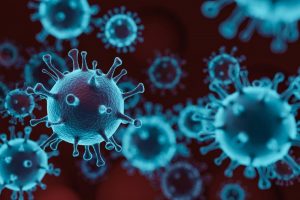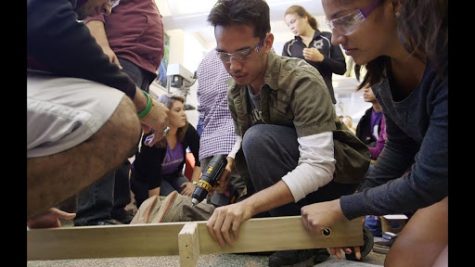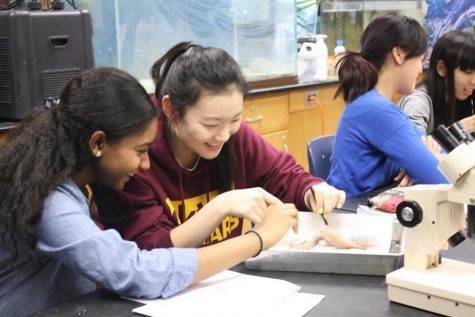Cherry Hill introduces new science electives for the 2021-2022 school year
Starting in the 2021-2022 school year, Cherry Hill East and Cherry Hill West will offer four new science electives: Climate Science to Action, Infectious Disease, Introduction to Engineering, and Marine Biology.
“The goal really is to give more opportunities for students to take a science that might be of interest to them,” said Mr. Scott Goldthorp, the district science supervisor. The courses will give students a deeper dive into topics and concepts that they may not typically get to explore during the traditional biology, chemistry, and physics courses. Each new elective is a half-year course, and counts for 2.5 credits. Additionally, all four of the science courses will be available to all students from grades 9-12 at both high schools.
“By having these new electives,” said Mrs. Holly Sassinsky, a biology and forensics teacher at East, “it kind of opens up the door for freshmen and sophomores to take a second science [class] and maybe explore some topics that they might be interested in.”
The majority of East’s current science electives, such as forensics, human anatomy, as well as the AP science classes, are geared towards juniors and seniors by nature. However, these new science courses are available to all high school students and do not require any prior knowledge in biology, chemistry, or physics, which will allow more students to gain experience and background in studies of their interest.
Goldthrop said that a combination of student voice and teacher voice took part in picking these courses for the schools. Back in December of 2020, teachers at both high schools surveyed their students about electives that they hoped to see at East and West. This data, coupled with teachers’ own suggestions for new courses and teachers’ background information, were considered when making the decision of which electives to add for the 2021-2022 school year.
Currently, the specifics of how each elective will run is not yet set in stone, meaning the curriculums have not yet been written, and the administration has not yet decided which teachers will be teaching the new courses.
The administration hopes to continue to offer courses outside the standard biology, chemistry, and physics classes in the future. “[We hope these courses can] help inspire students and give them the experience [so that] before they leave us in Cherry Hill, they can know a little bit more about the world around them, and what they want to pursue after graduation,” said Goldthorp.
Climate Science to Action
Climate Science to Action will teach students about the science behind climate change, as well as encourage them to investigate possible solutions to climate change.

“Climate change is something that is a current event, it’s something that you hear a lot about in the news, and it’s something that’s affecting all of us,” says Sassinsky.
The Climate Science to Action course will explore topics in environmental science, ecology, biology, chemistry, and weather, and more. Additionally, students will study key indicators of climate change, such as temperature, precipitation, sea level rise, and extreme weather events. The course aims to help students make connections between the current issue of climate change and science. “I think any of [the new] electives have that connection: a connection between the actual world and science,” said Sassinsky.
Infectious Disease
In Infectious Disease, students will develop an understanding of how infectious diseases, such as Covid-19, Zika, Ebola, HIV, and SARS, spread, and will also explore how we can predict and control their spread. Students will learn about the origin, biology, and evolution of these viruses, as well as techniques and concepts such as PCR, CRISPR, DNA sequencing, DNA sequence analysis, antibody studies, and viral culture, and how they pertain to the study of infectious diseases and immunity.

“Especially now, when we are experiencing a global pandemic, I think students should be aware of how these infectious diseases originate and how they spread so quickly, easily becoming a threat,” says Julia Chan (‘23), who plans to take the Infectious Disease course next year.
Introduction to Engineering
East will also be adding Introduction to Engineering as an elective next year. The introductory level course will incorporate material design, civil engineering, and mechanical engineering into the curriculum, and students will be involved in many different hands-on engineering projects.

“We obviously have a strong robotics program here at East, so it’s kind of natural that this kind of class could be added,” said Sassinsky. In addition to robotics, students will also work with engineering concepts such as simple machines, programming, statistical analysis, and bridge design. Overall, the elective will give students many opportunities to get a hands on experience with engineering and to practice problem solving.
Marine Biology
Marine Biology is the fourth science elective added to the Cherry Hill high school curriculum. The course will dive into concepts and topics about aquatic life and how living things in the aquatic world interact with the environment around them, as well as how oceans, lakes, rivers, and other bodies of water influence life on land.

“People just typically think of fish and sharks and dolphins and whales, but there’s a lot more that goes into [marine biology] than that,” says Sassinsky, who was a marine biologist before becoming a teacher. The Marine Biology course covers a wide range of topics, from marine life and ecosystems to oceanography to the effect that humans have on aquatic environments. Students will learn about different types of aquatic ecosystems, from polar region ecosystems to coral reefs. Marine Biology will also teach students about the chemical and physical features of the ocean, such as water chemistry, plate tectonics, and waves, tides, and currents. Additionally, the course plans to incorporate lessons and discussions about how climate change and human activity affect the aquatic world.
Sarah Herzfeld (‘24), a student who plans to take Marine Biology in the 2021-2022 school year, said, “I think it’s very cool how [the course] will touch many different subjects that are encased in the board term of marine biology.”

